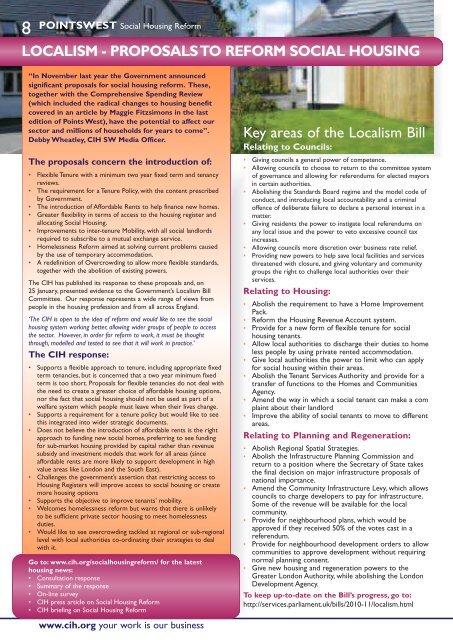Points West - Chartered Institute of Housing
Points West - Chartered Institute of Housing
Points West - Chartered Institute of Housing
- No tags were found...
Create successful ePaper yourself
Turn your PDF publications into a flip-book with our unique Google optimized e-Paper software.
8POINTSWEST Social <strong>Housing</strong> ReformLOCALISM - PROPOSALS TO REFORM SOCIAL HOUSING“In November last year the Government announcedsignificant proposals for social housing reform. These,together with the Comprehensive Spending Review(which included the radical changes to housing benefitcovered in an article by Maggie Fitzsimons in the lastedition <strong>of</strong> <strong>Points</strong> <strong>West</strong>), have the potential to affect oursector and millions <strong>of</strong> households for years to come”.Debby Wheatley, CIH SW Media Officer.The proposals concern the introduction <strong>of</strong>:• Flexible Tenure with a minimum two year fixed term and tenancyreviews.• The requirement for a Tenure Policy, with the content prescribedby Government.• The introduction <strong>of</strong> Affordable Rents to help finance new homes.• Greater flexibility in terms <strong>of</strong> access to the housing register andallocating Social <strong>Housing</strong>.• Improvements to inter-tenure Mobility, with all social landlordsrequired to subscribe to a mutual exchange service.• Homelessness Reform aimed at solving current problems causedby the use <strong>of</strong> temporary accommodation.• A redefinition <strong>of</strong> Overcrowding to allow more flexible standards,together with the abolition <strong>of</strong> existing powers.The CIH has published its response to these proposals and, on25 January, presented evidence to the Government’s Localism BillCommittee. Our response represents a wide range <strong>of</strong> views frompeople in the housing pr<strong>of</strong>ession and from all across England.‘The CIH is open to the idea <strong>of</strong> reform and would like to see the socialhousing system working better, allowing wider groups <strong>of</strong> people to accessthe sector. However, in order for reform to work, it must be thoughtthrough, modelled and tested to see that it will work in practice.’The CIH response:• Supports a flexible approach to tenure, including appropriate fixedterm tenancies, but is concerned that a two year minimum fixedterm is too short. Proposals for flexible tenancies do not deal withthe need to create a greater choice <strong>of</strong> affordable housing options,nor the fact that social housing should not be used as part <strong>of</strong> awelfare system which people must leave when their lives change.• Supports a requirement for a tenure policy but would like to seethis integrated into wider strategic documents.• Does not believe the introduction <strong>of</strong> affordable rents is the rightapproach to funding new social homes, preferring to see fundingfor sub-market housing provided by capital rather than revenuesubsidy and investment models that work for all areas (sinceaffordable rents are more likely to support development in highvalue areas like London and the South East).• Challenges the government’s assertion that restricting access to<strong>Housing</strong> Registers will improve access to social housing or createmore housing options• Supports the objective to improve tenants’ mobility.• Welcomes homelessness reform but warns that there is unlikelyto be sufficient private sector housing to meet homelessnessduties.• Would like to see overcrowding tackled at regional or sub-regionallevel with local authorities co-ordinating their strategies to dealwith it.Go to: www.cih.org/socialhousingreform/ for the latesthousing news:• Consultation response• Summary <strong>of</strong> the response• On-line survey• CIH press article on Social <strong>Housing</strong> Reform• CIH briefing on Social <strong>Housing</strong> Reformwww.cih.org your work is our businessKey areas <strong>of</strong> the Localism BillRelating to Councils:• Giving councils a general power <strong>of</strong> competence.• Allowing councils to choose to return to the committee system<strong>of</strong> governance and allowing for referendums for elected mayorsin certain authorities.• Abolishing the Standards Board regime and the model code <strong>of</strong>conduct, and introducing local accountability and a criminal<strong>of</strong>fence <strong>of</strong> deliberate failure to declare a personal interest in amatter.• Giving residents the power to instigate local referendums onany local issue and the power to veto excessive council taxincreases.• Allowing councils more discretion over business rate relief.• Providing new powers to help save local facilities and servicesthreatened with closure, and giving voluntary and communitygroups the right to challenge local authorities over theirservices.Relating to <strong>Housing</strong>:• Abolish the requirement to have a Home ImprovementPack.• Reform the <strong>Housing</strong> Revenue Account system.• Provide for a new form <strong>of</strong> flexible tenure for socialhousing tenants.• Allow local authorities to discharge their duties to homeless people by using private rented accommodation.• Give local authorities the power to limit who can applyfor social housing within their areas.• Abolish the Tenant Services Authority and provide for atransfer <strong>of</strong> functions to the Homes and CommunitiesAgency.• Amend the way in which a social tenant can make a complaint about their landlord• Improve the ability <strong>of</strong> social tenants to move to differentareas.Relating to Planning and Regeneration:• Abolish Regional Spatial Strategies.• Abolish the Infrastructure Planning Commission andreturn to a position where the Secretary <strong>of</strong> State takesthe final decision on major infrastructure proposals <strong>of</strong>national importance.• Amend the Community Infrastructure Levy, which allowscouncils to charge developers to pay for infrastructure.Some <strong>of</strong> the revenue will be available for the localcommunity.• Provide for neighbourhood plans, which would beapproved if they received 50% <strong>of</strong> the votes cast in areferendum.• Provide for neighbourhood development orders to allowcommunities to approve development without requiringnormal planning consent.• Give new housing and regeneration powers to theGreater London Authority, while abolishing the LondonDevelopment Agency.To keep up-to-date on the Bill’s progress, go to:http://services.parliament.uk/bills/2010-11/localism.html
















